Dream debate
Updated: 2014-04-20 08:00
By Andrew Moody (China Daily)
|
||||||||
How does the Chinese dream compare to the aspirations and goals of other nations?
President Xi Jinping has made clear he wants Chinese people to realize their dreams.
On a recent visit to Europe, he laid out the importance of his vision for the country in a speech in Paris marking the 50th anniversary of diplomatic relations with France.
"According to history, realizing the Chinese dream would bring opportunities rather than threats, peace rather than turmoil in the world. It will help the world make progress in various respects," he said.
But how does the Chinese dream differ from perhaps the most famous of all, the American dream, or ones that are perhaps less well-known or scarcely even recognized in Europe?
A new survey by UK advertising and public relations giant WPP, "The Power and Potential of the Chinese Dream", suggests the concept of a dream is far better understood in China than in the United States.
Some 89 percent of respondents in China said they knew about the concept, compared to 73 percent of Americans. In the United Kingdom, only 13 percent had any idea of a British dream. Nearly four in five (79 percent) Chinese people also believed that having a dream made them more confident about facing the future, which was true of 55 percent of Americans and only 39 percent of Britons.
In the first of a two-part series, we look at the significance of the Chinese dream and where it fits among the dreams and aspirations of other countries.
Doreen Wang, deputy managing director of Millward Brown China, the global research consultancy arm of WPP, who worked on the report, said the Chinese dream has now taken center stage in China.
"I still think, however, there is a gap between the national dream and individual dreams in China. The national dream is about building a powerful country and maintaining economic growth. Individual dreams are mainly concerned with their own financial position, maintaining their health and reducing pollution."
Xi made achieving the Chinese dream his central aim when he became head of the Communist Party of China in November 2012.
He sought national rejuvenation and for China to re-establish its position as a country of stature and power after the humiliations of the 19th century and the first half of the last century.
Many have suggested he was just echoing the American dream, which dates back to the 19th century and is famously about individuals being free to achieve their goals and aspirations.
But many historians believe the Chinese dream has its own heritage and dates back to the country's first emperor Qin Shi Huang, who achieved his own vision of uniting China after the Warring States Period in 221 BC.
It was also evoked in one of the great classics of Chinese literature, Cao Xueqin's Dream of the Red Mansion, the mid-18th century novel that relates to the aims and aspirations of Chinese society.
The concept is also to a large extent embedded in the country that Mao Zedong aimed to create when he founded New China in 1949.
John Delury, co-author of the recent book, Wealth and Power: China's Long March to the Twenty-first Century, said the major difference between the Chinese and American dreams is that the former is more that of the nation as a whole rather than for individuals.
"It is a unitary dream. It is a dream for the country and all the people are united around that purpose. So you do see - in a crude sense at least - a difference between it and the American dream, which is inseparable from an individualistic spirit, dating back to the 19th century, of the self-made man."
Delury, who is also assistant professor of East Asian Studies at Yonsei University's Graduate School of International Studies and Underwood International College in Seoul, said the idea of a dream in China is not some nebulous concept, as some have suggested.
"China's ruling elite for almost 200 years - both the rulers and the thinkers - have had this very strong concept of a dream. In fact, Orville (Schell, his co-author) and I almost thought at the last moment of working 'dream' into the title of our book as a leitmotif."
The Chinese dream, as expressed by Xi, is perhaps designed to be more stirring than the central themes that defined the leadership of his predecessors, who tended to focus on practical goals.
The Deng Xiaoping Theory began the reform and opening-up process, kickstarting China's phenomenal economic growth of the past three decades and more.
His successor, Jiang Zemin, also set a pragmatic course with his Three Represents, which related to economic production, cultural development and political consensus.
For Xi's immediate predecessor Hu Jintao, it was the Scientific Outlook on Development that was important, placing technological advancement high on the agenda.
According to the WPP survey, Xi's message about national rejuvenation accords with what Chinese people think. Some 44 percent think they will be an equal power with the US in 10 years, compared to just 12 percent who think they have achieved parity today.
The dream he mapped out was also about Chinese citizens enjoying greater wealth and affluence by 2020 and fulfilling their own goals and aspirations.
The Chinese are far more optimistic about their living standards increasing than either the Americans or the British, according to the survey. Nearly two-thirds (63 percent) expected their income to grow by at least 7 percent a year, compared to just 26 percent of Americans and 17 percent of Britons.
Kerry Brown, professor of Chinese politics and director of the China Studies Centre at the University of Sydney, said the Chinese dream meets these aspirations.
"There is much more of a bigger imperative about the Chinese dream. It is about public mobilization and the vocabulary is richer, talking about people's aspirations and emotions.
"The period under Deng, for example, was less about idealism but a fairly hard grind. The Jiang Zemin and Hu Jintao periods were both very practical and realistic also."
Martin Jacques, the British academic and author of When China Rules the World: The End of the Western World and the Birth of a New Global Order, said the Chinese dream would not have been appropriate for any recent era but the current one.
"The Chinese dream is certainly a very un-Deng Xiaoping message. His period was all about prioritizing economic growth and reducing poverty. Everything else had to be subordinated. But ultimately these are narrow things.
"By using the term, Xi is announcing that China has entered a new phase and that we have reached a point where we have to think differently about the future. I think the Chinese dream sums up that position in a very powerful way."
Wang Yiwei, director of China-Europe Academic Network and a professor at the School of International Studies at Renmin University of China in Beijing, said the reason why the concept resonates with Chinese people is that it is deep-rooted in history.
"As a political phrase it may just date back to the 18th National Congress (of the Communist Party of China held in November 2012) but its three aspects - national prosperity, a powerful state and people's happiness - are not new. They have a long history and are related to old Chinese concepts of wealth, power and harmony."
Whether the Chinese dream translates to Europe is much more open to debate. The WPP survey certainly suggested this was not the case in the UK, with only 20 percent believing national dreams could actually be regarded as positive, compared to 48 percent of Americans and 70 percent of Chinese.
Jonathan Fenby, a China commentator and author of the recent book, Will China Dominate the 21st Century?, said the British do not tend to go in for dreams.
"I don't think the British are very dreamy people. They tend to be very suspicious of people who say, 'I have a vision or I have a dream for you'," he said.
"Even when we had someone like Margaret Thatcher who perhaps had a vision, it needed to be put across in straightforward, everyday terms. I think Britain as a whole regards itself as being more practical than theoretical."
Rana Mitter, director-designate of the new China Centre at Oxford University, which is set to open in September, agreed that dreams do not always go down well with the British.
"I would say a century or so ago there was something similar to a dream, although the British would never have called it that.
Mitter, also author of China's War with Japan, 1937-1945: The Struggle for Survival and presenter of the nightly BBC Radio3 arts program Night Waves in the UK, said Britain once did have a global vision.
"I think at the height of empire there was a spread of ideas that generated from Britain across the world. There was clearly a strong sense of identity of a cause or a mission. Once Britain's imperial role disappeared so did this sense of wider mission."
Whether wider Europe has any more sense of a dream is perhaps a more difficult question to answer.
Delury at Yonsei University's Graduate School of International Studies said one sense of a collective vision or dream that Europe has is the European Union and it is one that East Asia has struggled to replicate.
"I think a dream in Europe is less about any particular country's dream but about the European Union. I think it is an incredible experiment that - to a large extent - has worked over decades.
"China may have its own dream but there is no sense of an East Asian one. If anything we are moving away from any sense of a community and therefore there is a higher chance of actual conflict in the region."
Mitter, however, doesn't think that the European Union is a substitute for a dream.
"It is not really a dream but a political model. It has a slightly technocratic feel about it and that has been one of the things that has been problematic for Europe in seeking to find its identity in the past couple of decades.
"I think after World War II, it had a very big specific idea about a desire never to go to war again and I think that is now inconceivable. It is less about that now and I think it is difficult to build emotion around European enlargement or the single currency. The point about dreams is that they have to be emotional."
Fenby, also director of China research at London-based research organization Trusted Sources, who has just returned from a tour of European capitals, said it is the dream of a more unified Europe that now scares people.
"Working together for the greater common good is still a dream and ideal but the problem is that it has proved very difficult. You now have all these people on the other side, the so-called Euroskeptics - including Nigel Farage of the UK Independence Party in Britain and Marine Le Pen of the National Front in France - who regard greater European convergence as a nightmare rather than a dream."
Junheng Li, author of Tiger Woman on Wall Street, which will shortly be published in Chinese in China, has experienced both dreams first hand.
She was brought up in Shanghai and has gone on to build a successful career in the US, now running her own New York-based equity research firm specializing in China, JL Warren Capital.
"Frankly, I don't think there is much difference between the Chinese dream and the American dream. In America, the preoccupation is about getting rich, owning a house, a few cars, having a big family and being materially successful," she said.
Li, however, believes Xi's concept of a Chinese dream also is about making China powerful again. "There is this strong top-down element to it also, about returning the country to its former glory, which is part of the message that is being conveyed."
Delury at Yonsei University agrees that it is wrong to present the American and Chinese dreams as polar opposites.
"It is very easy to come up with this characterization of China as being collectivist. Anyone who spends any time in China knows that it is an intensely individualistic society at this moment in its history. So I think when any notion of a dream is rolled out in China it has to take account of that individualistic quality."
andrewmoody@chinadaily.com.cn
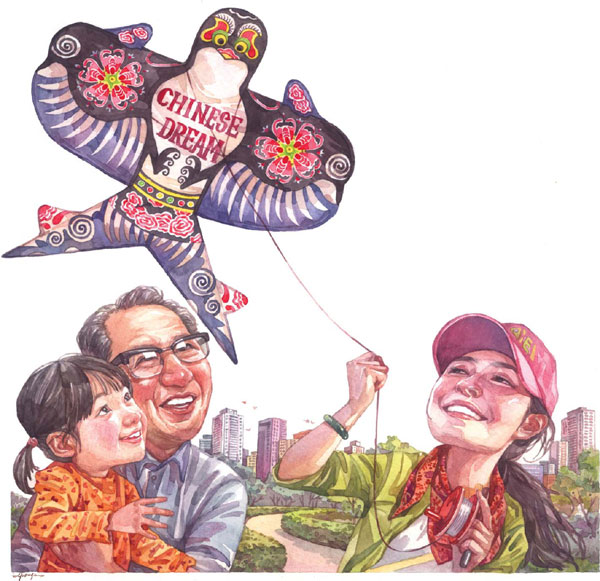
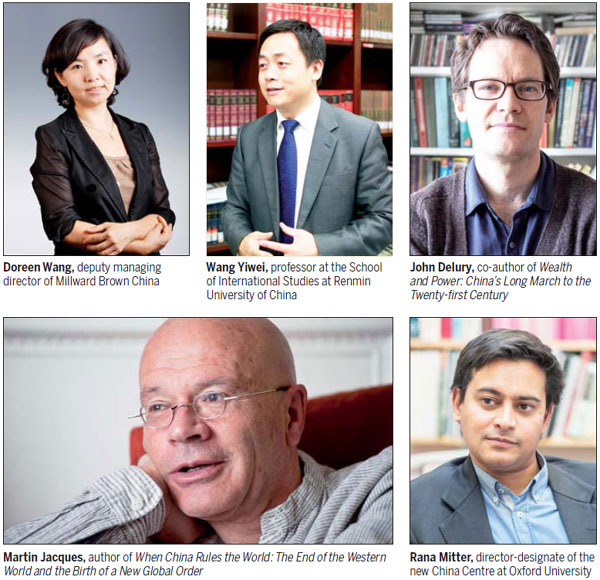
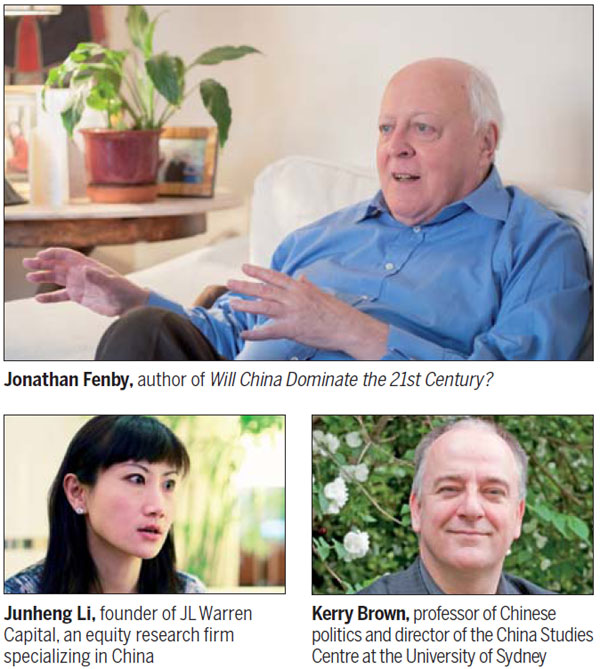
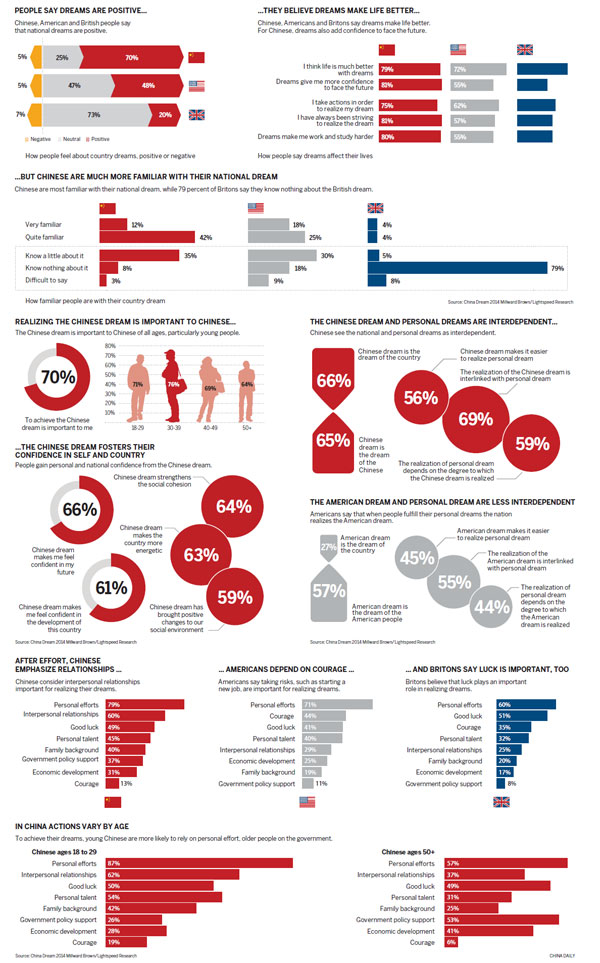
(China Daily 04/20/2014 page20)

 William, Kate visit Australian air force base
William, Kate visit Australian air force base
 Top 10 Chinese Internet firms eyeing IPOs in US
Top 10 Chinese Internet firms eyeing IPOs in US
 Google glass making profits in China
Google glass making profits in China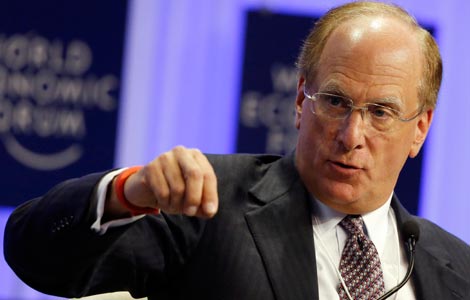
 BlackRock licensed to invest further in China using yuan
BlackRock licensed to invest further in China using yuan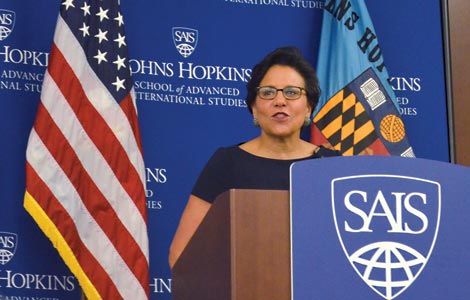
 US Commerce chief vows trade growth
US Commerce chief vows trade growth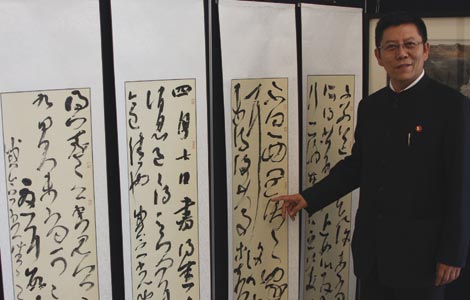
 UN hosts Chinese Language Day
UN hosts Chinese Language Day
 Runners and their 4-legged friends race in New York
Runners and their 4-legged friends race in New York
 Chinese cop cadets learn about US police work
Chinese cop cadets learn about US police work
Most Viewed
Editor's Picks

|

|

|

|

|

|
Today's Top News
Death toll of S. Korean ferry sinking rises to 33
New human H7N9 case reported
China on frontlines of cyber threat
China raises alert against cancer
Sunken ferry relatives give DNA swabs to help identify victims
Weibo, Leju go public in New York
Silicon mayors on mission to China
Hainan Air announces 1st Beijing to Boston directs
US Weekly

|

|








